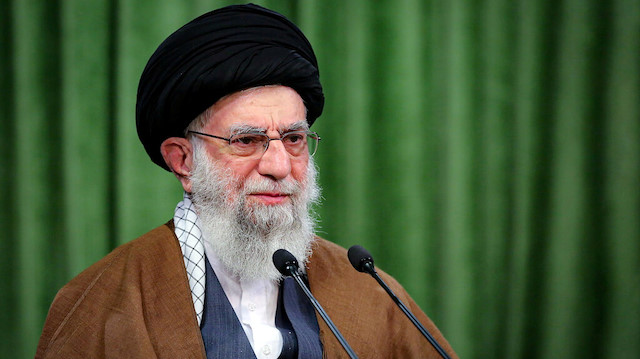
Iran slated to stop implementation of Additional Protocol to NPT, limiting IAEA access to country’s nuclear sites
Iran's Supreme Leader said Monday his country "will not back down" on its right to pursue its nuclear program and could enrich uranium up to 60% purity for civilian use.
Ayatollah Ali Khamenei was addressing a meeting of the Assembly of Experts, a powerful 88-member clerical body, in the Iranian capital Tehran.
“Like other issues, the Islamic Republic will not back down on the nuclear issue and will continue to move forward on the basis of the country’s present and future needs," he noted.
He said Iran "does not seek nuclear weapons," adding even if the Islamic Republic decided to produce them, no one could prevent it from doing so.
"That international Zionist clown has said they won't allow Iran to produce nuclear weapons," he remarked, obliquely referring to Israeli premier Benjamin Netanyahu. "First of all, if we had any such intention, even those more powerful than him would not be able to stop us."
On Iran's scaling back of commitments under the 2015 nuclear accord, Khamenei said Tehran will return to full compliance when other signatories fulfill their obligations.
He also called on the Hassan Rouhani-led government and parliament to "resolve their differences" on implementing the recently passed law aimed at countering US sanctions.
As part of the law, Iran is slated to stop the implementation of the Additional Protocol to the Non-Proliferation Treaty (NPT) on Feb. 23, limiting the access of inspectors from the UN nuclear watchdog, the International Atomic Energy Agency (IAEA), to Iranian nuclear sites.
Iran's leader termed it a "good law" and said it should be "executed precisely."
-'Bad deal'
Pertinently, Iran's conservative-dominated parliament has taken umbrage to the deal reached between Iran's nuclear agency and the IAEA during IAEA Director General Rafael Grossi's visit to Tehran on Sunday.
Iranian lawmakers on Monday criticized Tehran's decision to allow “necessary” monitoring by the UN nuclear watchdog for up to three months, saying it goes against the spirit of the law, which calls for ending all snap inspections beyond the NPT safeguards agreement.
"The government has no right to decide and act arbitrarily," the head of parliament's national security and foreign policy committee, Mojtaba Zolnour, was quoted as saying by local media.
Under the agreement reached between Iran and the IAEA on Sunday, Iran will hold back camera footage at its nuclear facilities for three months.
If sanctions are lifted in that period, the data will be shared with the agency. Otherwise, it will be destroyed, according to Iran's permanent envoy to Vienna-based international organizations Kazem Gharibabadi.
This, however, has not gone down well with lawmakers. Iran's parliament speaker Mohammad Baqer Qalibaf said Monday that Iran is "determined to stop" implementation of the Additional Protocol and limit the access of the IAEA inspectors beyond the safeguards agreement.
He asked parliament's national security and foreign policy commission and energy commission to conduct field inspections and submit a report, adding "any violation of the law" will be dealt with according to the law.
In a joint statement Sunday, Iranian lawmakers stressed the need for the government to stop voluntary implementation of the Additional Protocol.
"The practical and complete revocation of banking and oil sanctions are among the fundamental conditions for the US to return to the nuclear deal, and without lifting the cruel sanctions that can be verified by the Iranian nation, Iran will not stop its proud and strong steps of industrial and nuclear progress,” the statement noted.
-"Wise move"
In response, the government issued a lengthy statement late Monday expressing "deep regret" over the remarks of some lawmakers, terming the criticism "irrational."
The statement said the government is obliged to implement the laws passed by parliament and the action in accordance with the recent law will be taken on Feb. 23.
The negotiations and agreement between the Iranian government and UN nuclear watchdog, it noted, have been "in accordance with the Constitution and laws of the country."
"In line with parliament's law, no extra-judicial access will be granted to the [UN] agency and no extra-supervisory inspections will be conducted,” the statement said, noting that the purpose of "continuing the necessary verification and monitoring" is for Iran to "retain the information of certain monitoring activities and equipment specified in the annex."
It termed the move "wise" and aimed at "implementing both the law of parliament and reducing the costs of implementing the law."






